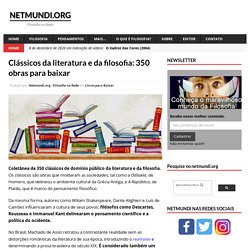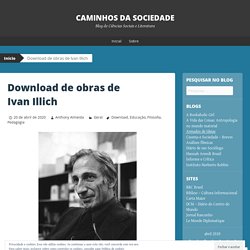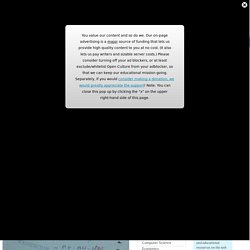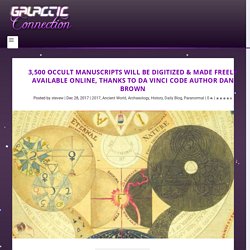

Clássicos da literatura e da filosofia: 350 obras para baixar - netmundi.org. Coletânea de 350 clássicos de domínio público da literatura e da filosofia.

Os clássicos são obras que moldaram as sociedades, tal como a Odisseia, de Homero, que delineou o ambiente cultural da Grécia Antiga, e A República, de Platão, que é marco do pensamento filosófico. Da mesma forma, autores como Wiliam Shakespeare, Dante Alighieri e Luís de Camões influenciaram a cultura de seus povos; filósofos como Descartes, Rousseau e Immanuel Kant delinearam o pensamento científico e a política do ocidente. No Brasil, Machado de Assis retratou a contrastante realidade sem as distorções românticas da literatura de sua época, introduzindo o realismo e determinando a prosa brasileira do século XIX. É considerado também um dos grandes autores da literatura mundial. Conhecer nossos autores clássicos é compreender nossa identidade. Os clássicos da literatura e da filosofia, devidamente situados em seu momento histórico, são obras que fazem parte do processo civilizatório. Alexandre Dumas Antologia Safo.
Connecting with the Arcturians ( PDFDrive ) Zaneti hermes complo base e book. Me4673. Download de obras de Ivan Illich. Ivan Illich nasceu em Viena no ano de 1926.

Sua família mudou-se para Roma, onde Illich completou os seus estudos: física (Florença), filosofia e teologia (Roma) e doutoramento em História (Salzburgo). Por ser fluente em dez línguas, Illich tornou-se intérprete do Cardeal Spellman (nova York) e teve como função preparar religiosos para a comunidade hispano-americana. Nos anos 60 mudou-se para o México onde criou o Centro Intercultural de Formação (CIF) – espécie de faculdade aberta. Faleceu em Bremen, na Alemanha em Dezembro de 2002 Propostas teóricas contra a EscolaEscreveu inúmeros artigos e livros, entre os quais: Sociedade sem Escolas em 1970.
Download Anthony Cardoso Curtir isso: Curtir Carregando... ©CPC The Circle of the Twelve. ChaosSolitonsandFractals182003537547. 2170922 EB I Heart Logs. ChaosSolitonsandFractals182003537547. 626 p 18. These 5 Censored Books Tell a History the Establishment Wants Hidden. Read the CIA's Simple Sabotage Field Manual: A Timeless, Kafkaesque Guide to Subverting Any Organization with "Purposeful Stupidity" (1944) I’ve always admired people who can successfully navigate what I refer to as “Kafka’s Castle,” a term of dread for the many government and corporate agencies that have an inordinate amount of power over our permanent records, and that seem as inscrutable and chillingly absurd as the labyrinth the character K navigates in Kafka’s last allegorical novel.

Even if you haven’t read The Castle, if you work for such an entity—or like all of us have regular dealings with the IRS, the healthcare and banking system, etc. —you’re well aware of the devilish incompetence that masquerades as due diligence and ties us all in knots. Why do multi-million and billion dollar agencies seem unable, or unwilling, to accomplish the simplest of tasks? Why do so many of us spend our lives in the real-life bureaucratic nightmares satirized in the The Office and Office Space? One answer comes via Laurence J. You can read and download the full document here. Organizations and Conferences Managers Employees. ATecnologiaOcultaDoPoder. Free Audio Books for Intellectual Exercise. 3,500 Occult Manuscripts Will Be Digitized & Made Freely Available Online, Thanks to Da Vinci Code Author Dan Brown.
OpenCulture December 20th, 2017 If there’s one thing The Da Vinci Code’s Dan Brown and “The Library of Babel”’s Jorge Luis Borges have in common it is a love for obscure religious and occult books and artifacts.

But why do I compare Borges—one of the most highly-regarded, but difficult, of Latin American poets and writers—to a famous American writer of entertaining paperback thrillers? One reason only: despite the vast differences in their styles and registers, Borges would be deeply moved by Brown’s recent act of philanthropy, a donation of €300,000 to Amsterdam’s Ritman Library, also known as the Bibliotheca Philosophica Hermetica House of Living Books. Brown, the Ritman notes, “is a great admirer of the library and visited on several occasions while writing his novels The Lost Symboland Inferno.”
In an introductory essay, the Ritman notes that academic interest in occult and hermetic writing has increased lately among scholars like W.J. Related Content: